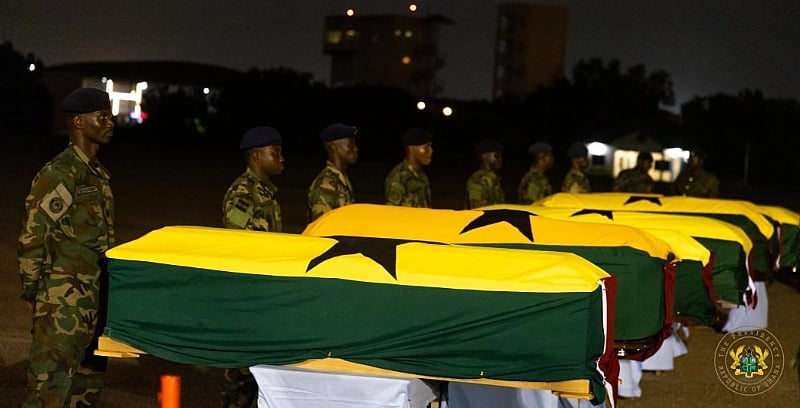The somber hues of a London sunset cast a long shadow over the Ghana Muslim Welfare Centre, transforming it into a haven for a grieving community. The tragic helicopter crash that claimed the lives of eight Ghanaians reverberated across the diaspora, drawing together compatriots in a shared expression of sorrow and prayer. Tears flowed freely as the community gathered at Seven Sisters Masjid, their collective grief palpable in the air. The Salatul Gha-ib, a prayer for the deceased performed in absentia, and the heartfelt supplications that followed resonated with the profound loss.
Among the departed were prominent figures who had dedicated their lives to the service of Ghana. Dr. Edward Omane Boamah, the Defence Minister, was remembered for his unwavering commitment to national security. Honourable Ibrahim Murtala Muhammed, the Minister for Environment, Science, and Technology, was lauded for his steadfast advocacy for progress. Alhaji Muniru Limuna, the National Security Coordinator, was mourned for his vigilance in safeguarding the nation. Their names echoed through the mosque, each syllable a testament to their service, sacrifice, and unwavering love for their homeland. They were not just officials, but fathers, brothers, sons, and devoted servants of Allah, their lives interwoven with the fabric of Ghana’s progress.
The tragedy transcended political divides, uniting individuals from across the political spectrum in a shared expression of grief. Members of the NDC’s Zongo Caucus stood shoulder-to-shoulder with NPP members, their usual political differences momentarily eclipsed by the overwhelming sense of loss. This poignant display of unity underscored the power of shared sorrow to bridge divides and foster a sense of collective national identity. Ghanaians from across the UK and Ireland converged on the mosque, drawn by the need to connect with their community and offer support during this period of national mourning.
Distinguished guests further enriched the gathering. Imam Hussein from the Ghana Islamic University at Cambridge University, though initially present for another program, graciously joined the congregation, offering his wisdom and guidance in their prayers. The presence of Alhaji Ibrahim Sunday, the esteemed Chief of Dogombas in the UK, added further significance to the occasion. Their participation served as a powerful reminder that during times of profound loss, community and faith provide essential anchors.
Imam Abdul Razak’s voice, heavy with emotion, carried the collective pain of a nation in mourning. Each utterance of “Allahu Akbar” resonated with the anguish of mothers, wives, and children who now faced a future without their loved ones. The silence between prayers was deafening, pregnant with unspoken grief, anxieties, and an unwavering faith in Allah’s divine plan. The prayers offered were not solely for the departed, but also for the nation as a whole. The congregation beseeched Allah for strength and comfort for the grieving families, for wisdom to guide the nation’s remaining leaders, for unity among the people, and for the healing of their wounded homeland.
The helicopter crash left an undeniable void in Ghana, snatching away leaders who were instrumental in shaping the nation’s trajectory. Dr. Omane Boamah’s strategic vision for national defence, Ibrahim Murtala Muhammed’s moral compass and environmental stewardship, and Alhaji Limuna’s invaluable security expertise – these were contributions that transcended the ordinary and could never be truly replaced. Their legacies would be remembered and honored, their contributions etched into the narrative of Ghana’s progress.
As the congregation dispersed from the mosque, a sense of shared responsibility permeated the air. The weight of grief remained, yet a sense of solace and resolve had also emerged. Death, the ultimate equalizer, served as a stark reminder of life’s fragility. It respected no title, acknowledged no accomplishment, and bowed to no earthly power. Yet, within the Islamic faith, there was solace in the belief that those who dedicated their lives to the service of humanity and the pursuit of justice lived on, their impact enduring long after their physical departure.
The leadership of the Ghana Muslim Welfare Centre, including figures like Wazirin UK Alhaji Masahud, Sarkin Fada Alhaji Baban Yara, Alhaji Sanusi Marafa, and Sarkin Zongo of Europe, extended an open invitation to all Ghanaians grappling with the profound loss. They emphasized that no one should bear this burden alone, and reiterated the Centre’s commitment to providing spiritual and emotional support during this challenging period. Their doors remained open, a tangible symbol of ongoing prayer, unwavering faith, and an unyielding commitment to the motherland.
With the profound words “Inna lillahi wa inna ilayhi raji’un” – Indeed, to Allah we belong and to Him we shall return – the community acknowledged the cyclical nature of life and the ultimate return to the Divine. The prayers continued, not just for the departed souls to find eternal peace in Jannatul Firdaus, but for Ghana to navigate this valley of shadows and emerge stronger, united, and guided towards a brighter future. The collective hope remained that Allah would grant solace to the grieving families, heal the nation, and illuminate the path forward for Ghana.


